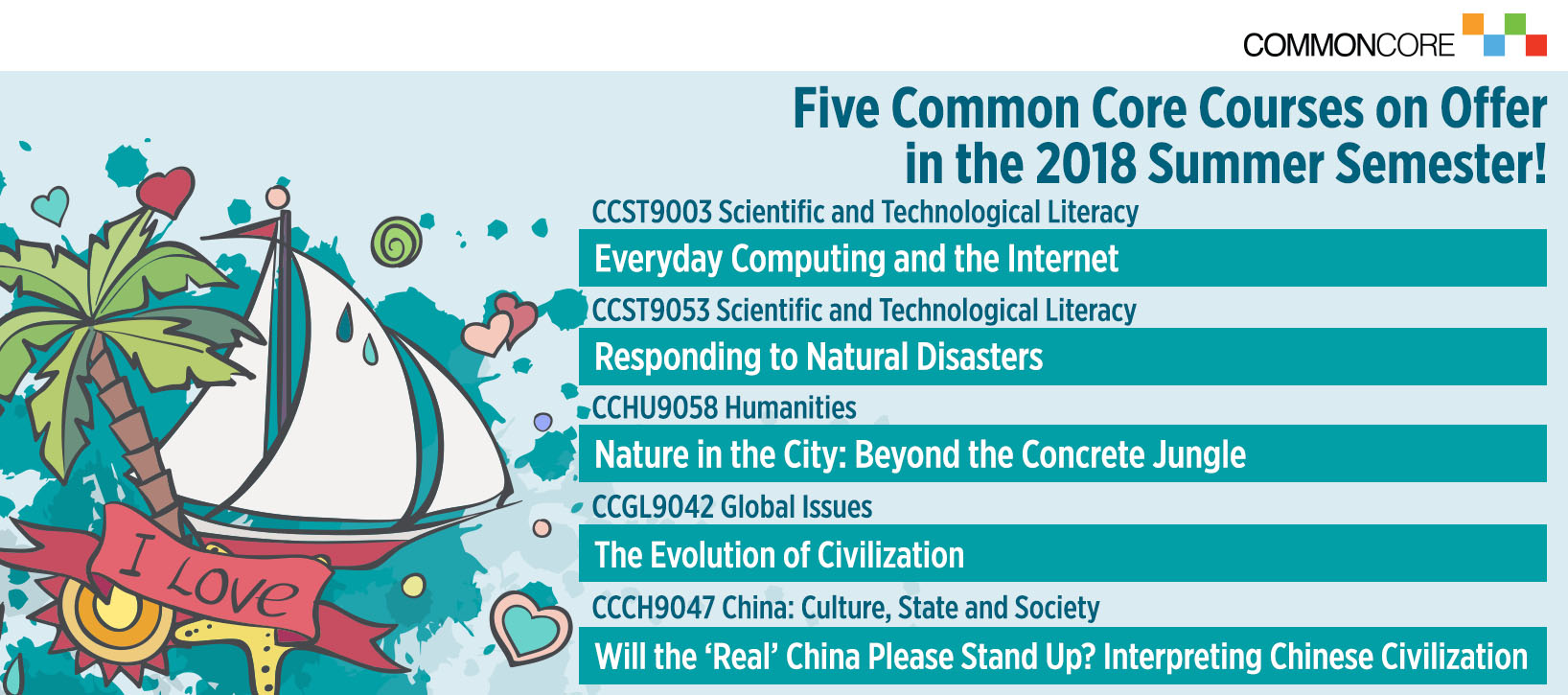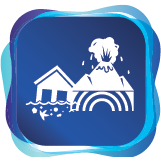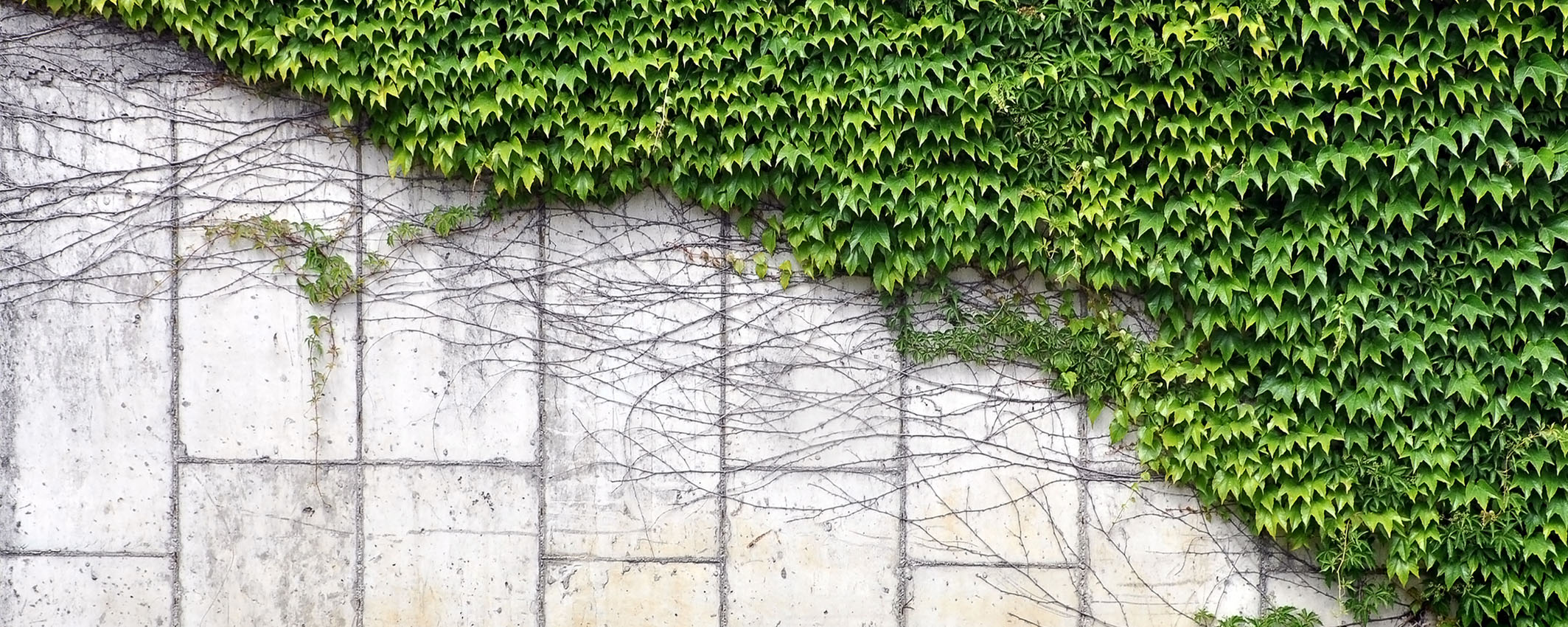Five Common Core Courses on Offer in the 2018 Summer Semester!

The Common Core (CC) is pleased to announce that five CC courses will be offered this summer:
‘Everyday Computing and the Internet’ (CCST9003),
‘Responding to Natural Disasters’ (CCST9053),
‘Nature in the City: Beyond the Concrete Jungle’ (CCHU9058),
‘The Evolution of Civilization’ (CCGL9042), and
‘Will the ‘Real’ China Please Stand Up?: Interpreting Chinese Civilization’ (CCCH9047).
A summary of the course details of the courses is at below.
WHO should take CC courses in the summer?
Taking CC courses in the summer would be ideal for you if you wish to get some relief from your heavy workload during the regular semesters, have a compressed format, and are interested in meeting new friends from different parts of the world.
Since the summer semester is optional, you can enroll for CC courses in the summer even if you have already successfully completed 24 credits of CC courses during the first and second semesters this year. Please note, however, that (i) the UG5 graduation requirement to successfully complete 36 credits of courses in the CC comprising at least one and not more than two courses from each AoI still applies; and (ii) CC courses cannot be taken as free electives.
Note: If you have been granted Advanced Standing and/or Credit Transfer for CC credits and are in doubt as to how many CC credits or courses from which AoI(s) you are required to complete for fulfilling the graduation requirement on the CC, please consult your home Faculty.
HOW to select courses on offer in the summer?
As with the regular semesters, CC courses are selected online through the Student Information System (SIS). The SIS will be opened for course selection during June 11 – 19, 2018 (please see http://aao.hku.hk/faculty-staff/cur-reg-date/aca-dates/ for details), and the course approval method is by auto-ballot.
* IMPORTANT: Courses with enrollments below 20 by the end of the course selection period will be cancelled. Students enrolled on a discontinued course will be notified through their HKU email soon after the course selection ends. Be sure to check your email!
Since the official SIS course selection for summer courses will not take place until June, to facilitate preparation, we would like to invite you to indicate your interest in taking CC courses in the summer by registering through the HKU Summer Institute. Here
* IMPORTANT: Registration through the Summer Institute does NOT guarantee course enrollment places. You will still need to enroll for the course(s) in the SIS and be selected by auto-ballot.
Make the Common Core your own and have a great summer!
 |
CCST9003 Scientific and Technological LiteracyEveryday Computing and the Internet[This course is under the thematic cluster of ‘Sustaining Cities, Cultures, and the Earth’.] |
CCST9004 Appropriate Technology for the Developing World /
CCST9015 Electronic Technologies in Everyday Life
Course Description
[This Common Core course is a Small Private Online Course (SPOC). Online materials will be available from the beginning of the semester, and a series of face-to-face interactive sessions will be held in HKU and Hong Kong during the period of July 16-20, 2018.]
In order to make informed decisions in this information age, everyone needs to have an efficient way to sift through and evaluate the myriads of information that is available through the Internet. The ultimate objective of this course is to help students develop a “computational” state of mind for everyday events. Specifically, the course will enable students to answer the following questions: What daily problems need to be solved by a computational method? Are such problems solvable? By what means can such problems be solved? Is it worthwhile to compute such problems? How do all these problems relate to the Internet that we use on a daily basis? We will also discuss intensively the societal impacts of computing technologies on our daily life. The course will be taught with minimal levels of mathematical and technical detail.
Online lectures would be available for the whole course, making room for more in-depth learning in lecture sessions. Specifically, four to five lecture sessions would be conducted in collaborative workshop formats, whereby students need to work in teams to complete hands-on tasks corresponding to the topics covered in the course.
[This course is also one of the two backbone courses of “Asia Immersion: HKU-PKU Summer Programme 2018 (Flipped Innovators)” (AIHP2018) organized by the HKU Summer Institute. Upon completion of CCST9003, students of the AIHP2018 Programme will take “Innovative Product Engineering Process”, a 2-PKU credit course offered by Peking University as well as a series of face-to-face interactive sessions held in Peking University and Beijing during July 21-August 4, 2018. For more information on the AIHP2018 programme details and application, please visit http://www.aal.hku.hk/summerinstitute/hkusi-2018-featured-courses/aihp2018/]

Course Learning Outcomes
On completing the course, students will be able to:
- Describe and explain, in a high-level manner, various representative computational algorithms (e.g. Google search, Google map route finding, etc.).
- Use the understanding of limitations on computability to judge whether a certain problem is computable.
- Apply the various “tricks” learnt in designing algorithms (e.g. recursion) to come up with a rough solution to a new problem.
- Demonstrate appreciation of the various technology frontiers and make informed judgments as to what new services/products we can expect to be derived from them.
- Critically judge whether a certain computing service/facility is likely to be beneficial to society.
- Demonstrate understanding that “computing” as a tool is a double-edge sword, and thus, reflect critically on whether we have been relying too much on computing devices in educating and entertaining young people.
Offer Semester and Day of Teaching
Summer Semester
Online learning and face-to-face interactive sessions during June 25-July 20, 2018
Study Load
| Activities | Number of hours |
| Lectures | 10 |
| Tutorials | 10 |
| Seminars / Guest lectures | 2 |
| Reading / Self-study | 20 |
| Online lectures | 8 |
| Online assessments | 2 |
| Assessment: In-class assignment | 12 |
| Assessment: Short one-page survey + 3-minute talk | 30 |
| Assessment: Project report writing | 16 |
| Assessment: Group project presentation (incl preparation) | 16 |
| Assessment: Simple quantitative homework assignments | 15 |
| Total: | 141 |
Assessment Ratio: 100% coursework
| Assessment Tasks | Weighting |
| Participation in classroom activities | 20 |
| Online assessment | 10 |
| Tutorials | 10 |
| Short survey | 15 |
| 3-minute talk | 15 |
| Project report | 15 |
| Group project presentation | 15 |
Required Reading
- Adleman, L. M. (1994). Molecular computation of solutions to combinatorial problems. Science, 266(5187), 1021-1024.
- Bailenson, J. N., Blascovich, J., Bleicher, A., DeTorres, C., Dunbar, R., Garfield, B., et al. (2011, June). IEEE Spectrum, 48(6). [A detailed report on social networking]
- Benenson, Y., Gil, B., Ben-Dor, U., Adar, R., & Shapiro, E. (2004). An autonomous molecular computer for logical control
of gene expression. Nature, 429(6990), 423-429. - Google. (2013). Google Flu Trends. From http://www.google.org/flutrends/
- Hany Farid’s research. From http://www.cs.dartmouth.edu/farid/research/tampering.html
- Hölzle, U. (2009). Powering a Google search. Google: Official Blog. From http://googleblog.blogspot.com/2009/01/powering-google-search.html
- Kuhnert, L., Agladze, K. I., & Krinsky, V. I. (1989, January). Image processing using light-sensitive chemical waves. Nature, 337, 244–247.
- Layton, J. (2009). How MapQuest works. How Stuff Works. From http://money.howstuffworks.com/mapquest.htm
- Watson, C. (1994). An image processing tutorial. From http://www.cs.washington.edu/research/metip/tutor/tutor.html
- Wing, J. M. (2006). Computational thinking. Communications of the ACM, 49(3), 33-35. From http://www.cs.cmu.edu/~CompThink/
Timely articles published on the Web and in other magazines (e.g. Science, Nature, Time, Newsweek, The Economist, Psychology Today, etc.)
Recommended Reading
- Conry-Murray, A. (2007). 5 keys to social networking success. InformationWeek. From http://www.informationweek.com/smb/50to249/5-keys-to-social-networking-success/229215271
- Feynman, R., Hey, A., & Allen, R. (2000). Feynman lectures on computation. Cambridge, MA: Perseus Books.
- Himanen, P. (2001). The hacker ethic, and the spirit of the information age (1st ed.). New York: Random House.
- IBM Research. Carbon nanotubes. From http://www.research.ibm.com/topics/popups/serious/nano/html/nanotubes.html
- Kling, R. (1980). Computing people. Society, 17(2), 14.
- Messmer, E. (2007). Quantum cryptography to secure ballots in Swiss election. Network World. From http://www.networkworld.com/news/2007/101007-quantum-cryptography-secure-ballots.html
- NVIDIA. (2009). Graphics processing unit (GPU). From http://www.nvidia.com/object/gpu.html
- Schneier, B. (2004). Secrets and lies: Digital security in a networked world. Indianapolis, IN: Wiley.
- Schneier, B. (2009). Crypto-Gram Newsletter. From http://www.schneier.com/crypto-gram.html
- Wing, J. M. (2008). Five deep questions in computing. Communications of the ACM, 51(1), 58-60.
Course Co-ordinator and Teacher(s)
| Course Co-ordinator | Contact |
| Professor Y.K. Kwok Department of Electrical and Electronic Engineering, Faculty of Engineering |
Tel: 2859 8059 Email: ykwok@eee.hku.hk |
| Teacher(s) | Contact |
| Professor Y.K. Kwok Department of Electrical and Electronic Engineering, Faculty of Engineering |
Tel: 2859 8059 Email: ykwok@eee.hku.hk |
| Ms. Andrea Qi Honorary Lecturer, Department of Electrical and Electronic Engineering, Faculty of Engineering |
Tel: 3917 6188 Email: andreaq@hku.hk |
 |
CCST9053 Scientific and Technological LiteracyResponding to Natural Disasters[This course is under the thematic cluster of ‘Sustaining Cities, Cultures, and the Earth’.] |
Course Description
This course focuses on a critical analysis of how science and technology are woven into our responses to natural disasters, especially (but not only) meteorological ones. Lectures and tutorials are arranged in such a way that students are led through the 3 phases of disaster response: preparation for a disaster, response during the acute event and post-disaster management. Students will learn not only the theoretical and practical bases of disaster response, but also skills that might enable them to save themselves and others in adverse conditions. In addition, we will examine the cultural function of disaster films and how they relate to scientific and technology issues.

Course Learning Outcomes
On completing the course, students will be able to:
- Describe and explain the basics of the interaction between science, technology and disasters.
- Reflect on the roles and responsibilities as a global citizen and an individual in a community in the context of disaster responses.
- Demonstrate an understanding of the different impacts of disasters and the uses and limitations of science and technology in our responses to them.
- Critically analyze the ethical aspects of the use of science and technology in disaster responses.
Offer Semester and Day of Teaching
Summer Semester
Jul 16 – Aug 10, 2018 (Tue & Thu) 10:30 am – 1:20 pm
Study Load
| Activities | Number of hours |
| Lectures | 24 |
| Tutorials | 10 |
| Fieldwork / Visits | 2 |
| Reading / Self-study | 25 |
| Assessment: Presentation (incl preparation) | 50 |
| Assessment: Reflection writing | 10 |
| Total: | 121 |
Assessment Ratio: 100% coursework
| Assessment Tasks | Weighting |
| In-class assessments | 10 |
| Tutorial participation | 15 |
| Individual presentation | 20 |
| Group presentation | 40 |
| Reflective writing | 15 |
Required Reading
[All texts will be provided on Moodle]
- Kapucu, N., & Ozerdem, A. (2013). Managing Emergencies and Crises. Barlett & Jones Learning. [Chap. 2]
- Society of Critical Care Medicine. (2009, January). Fundamentals of disaster management. [Chap. 13]
- UNISDR. (2015). Global assessment report on disaster risk reduction 2015 (Pocket Book). United Nations.
- World Bank. (2012). Urban risk assessments: An approach for understanding disaster and climate risk in cities. Washington, D.C: World Bank. [Chap. 3]
Recommended Reading
- Herring, S. C., Hoerling, M. P., Kossin, J. P., Peterson, T. C., & Stott, P. A. (Eds.). (2015, December). Explaining Extreme Events of 2014 from a Climate Perspective. Bulletin of the American Meteorological Society, 96(12), S1-S172.
- Lewis, J. (2012). The Good, The Bad and The Ugly: Disaster risk reduction versus Disaster Risk Creation (1st ed.). PLOS Currents Disasters.
- McGuire, B. (2000, May). Apocalypse: a natural history of global disasters. Blandford.
Recommended Websites
Course Co-ordinator and Teacher(s)
| Course Co-ordinator | Contact |
| Dr L.P. Leung LKS Faculty of Medicine |
Tel: 3917 9343 Email: leunglp@hku.hk |
| Teacher(s) | Contact |
| Dr L.P. Leung LKS Faculty of Medicine |
Tel: 3917 9343 Email: leunglp@hku.hk |
| Dr T.W. Wong LKS Faculty of Medicine |
Tel: 3917 9839 Email: drtwwong@hku.hk |
 |
CCHU9058 HumanitiesNature in the City: Beyond the Concrete Jungle[This course is under the thematic cluster of ‘Sustaining Cities, Cultures, and the Earth’.] |
Course Description
Nature and the city are frequently, but not always, in conflict. This course explores our relationship with the natural environment using the urban built infrastructure, cultural habits and traditions, and the creative arts to provide a framework for the students’ exploration of the intersection between the natural world and our urban environment
- Survey – The human relationship with nature in the urban context:
First, we will look for evidence of nature in the city, at different scales, and observe both our attempts to replicate or enhance nature and our attempts to exclude or suppress it (both of which are often unsuccessful). - Analysis – How that relationship influences the form of the city:
We will then critically explore the relationship between development and nature in the urban context, using an understanding of natural laws to investigate how cultural traditions, perceptions, and meanings, and the realities of urban infrastructure, lifestyle and economics, complement or flout those laws. - Design – Using an understanding of that relationship as a basis for articulating issues and ideas:
Finally, we will apply our observations and understanding of nature in the city to develop techniques, analyses, and metaphors, to illustrate and communicate issues related to other disciplines and to a variety of public stakeholders.
The course assignments include the production of a group video and a metaphorical poster, however artistic experience or ability is not a pre-requisite of the course. Support and guidance for these elements will be provided as part of the course lectures, tutorials and demonstrations.

Course Learning Outcomes
On completing the course, students will be able to:
- Understand issues related to nature in the city, the historical relationship between human activity and nature in the urban context, and the spectrum between ‘artificial’ and ‘natural’.
- Articulate the contradictions and expectations in the relationship between us and nature.
- Demonstrate how to contextualize these understandings in the students own disciplinary studies, using metaphor, analogies and illustrative skills.
Offer Semester and Day of Teaching
Summer Semester
July 2 – 27, 2018 (Tue and Fri) 10:00 am – 12:50 pm
Study Load
| Activities | Number of hours |
| Lectures | 16 |
| Tutorials | 8 |
| Fieldwork / Visits | 3 |
| Demonstration | 3 |
| Interactive games | 3 |
| Peer evaluation | 3 |
| Reading / Self-study | 10 |
| Assessment: Essay / Report writing | 30 |
| Assessment: Group video production and presentation | 20 |
| Assessment: Poster | 40 |
| Total: | 136 |
Assessment Ratio: 100% coursework
| Assessment Tasks | Weighting |
| Tutorial participation | 10 |
| Group video presentation | 20 |
| Individual assessment: Written opinion piece | 30 |
| Poster | 40 |
Required Reading
- Altman, I., & Chemers, M. M. (1980). Culture and environment. Brooks/Cole Publishing Company. [Chap. 2]
- Cronon, W. (1996). Uncommon ground: Rethinking the human place in nature. W.W. Norton & Company. [Introduction]
- Lima, M. (2014). The book of trees: Visualizing branches of knowledge. New York: Princeton Architectural Press.
- Weisman, W. (2007). The world without us. Thomas Dunne Books, St. Martin’s Press, New York. [Chaps. 3, 7]
Recommended Website(s)
Recommended Reading
- Corlett, R. T. (1997). Human impact on the flora of Hong Kong Island. In N. G. Jablonski (Ed.), The changing face of East Asia during the Tertiary and Quaternary (pp.400-412). Proceedings of the Fourth Conference on the Evolution of the East Asian Environment. Centre of Asian Studies, The University of Hong Kong.
- Hageneder, F. (2001). The heritage of trees, history, culture and symbolism. Edinburgh: Floris Books.
- McHarg, I. L. (1964). The place of nature in the city of man. The Annals of the American Academy of Political and Social Science, 352(1), 1-12.
- Owen, B., & Shaw, R. (2007). Hong Kong landscapes: Shaping the Barren Rock (HKU Press Digital Eds.). Hong Kong: Hong Kong University Press.
- Swanwick, C., Dunnett, N., & Woolley, H. (2003). Nature, role and value of green space in towns and cities: An overview. Built Environment, 29, 94-106.
- Swyngedouw, E., & Kaika, M. (2000). The environment of the city… or the urbanization of nature. A Companion to the City, 567-580.
- Wang Shaoqiang (Ed.) (2015). Look at Me! New Poster Design. Sandu Publishing Co., Ltd.
Course Co-ordinator and Teacher(s)
| Course Co-ordinator | Contact |
| Mr G.S. Coates Department of Architecture, Faculty of Architecture |
Tel: 3917 5140 Email: gscoates@hku.hk |
| Teacher(s) | Contact |
| Mr G.S. Coates Department of Architecture, Faculty of Architecture |
Tel: 3917 5140 Email: gscoates@hku.hk |
 |
CCGL9042 Global IssuesThe Evolution of Civilization[This course is under the thematic cluster of ‘Sustaining Cities, Cultures, and the Earth’.] |
Course Description
This course will draw on economics, evolutionary theory, and psychology to address the key issues:
- How did humans go from relatively isolated tribal life to an increasingly cooperative, interconnected, globalized world?
- How can our knowledge of human nature and past progress be used to help solve major societal challenges?
The theme of this course is that natural selection is a useful framework for understanding how humans have progressed from subsisting in relatively isolated groups to where individuals are highly specialized in their productive efforts and highly integrated with the entire world through globalization. The course will explore how this progression may be the result of genetic selection, but likely more the result of selection acting on ideas, or memes, rather than genes, but in an analogous manner.
Through an understanding of human evolution, the origin of economic development will be explored. Combined with the psychological perspective of understanding the individual, we attempt to shed light on how complex civilization has come into existence. Lectures will ask one or two main scientific questions and then focus on answering them, showing the types of evidence that can be used to address the question and the logical progression of ideas.

Course Learning Outcomes
On completing the course, students will be able to:
- Demonstrate an understanding and awareness of the various domains of human progress.
- Describe and explain the basic principles of evolutionary theory as a model for human progress.
- Demonstrate an understanding of how trade and specialization are central to human advancement.
- Apply knowledge and understanding of evolutionary theory, psychology, and the scientific method to solving several societal problems.
Offer Semester and Day of Teaching
Summer Semester
July 2 – 27, 2018 (Mon, Wed and Fri) 9:30 am – 11:20 am
Study Load
| Activities | Number of hours |
| Lectures | 24 |
| Tutorials | 10 |
| Reading / Self-study | 60 |
| Assessment: Presentation (incl preparation) | 20 |
| Assessment: Reflective writing | 20 |
| Total: | 134 |
Assessment Ratio: 100% coursework
| Assessment Tasks | Weighting |
| Class discussion | 25 |
| Group presentation | 25 |
| Reflective writing | 25 |
| In-class quizzes | 25 |
Required Reading
- Ridley, M. (2010). The rational optimist: How prosperity evolves. New York: Harper.
Recommended Reading
- Axelrod, R. (2009). The evolution of cooperation (Rev. ed.). Basic Books.
- Clark, G. (2007). A farewell to alms. Princeton: Princeton University Press.
- Harford, T. (2011). Adapt. New York: Farrar, Straus and Giroux.
- Shirky, C. (2008). Here comes everybody. New York: Penguin Press.
Recommended Website
Course Co-ordinator and Teacher(s)
| Course Co-ordinator | Contact |
| Dr L.W. Baum Centre for Genomic Sciences, Li Ka Shing Faculty of Medicine |
Tel: 2831 5106 Email: lwbaum@hku.hk |
| Teacher(s) | Contact |
| Dr L.W. Baum Centre for Genomic Sciences, Li Ka Shing Faculty of Medicine |
Tel: 2831 5106 Email: lwbaum@hku.hk |
 |
CCCH9047 China: Culture, State and SocietyWill the ‘Real’ China Please Stand Up?: Interpreting Chinese Civilization |
Course Description
This course asks, what do we really know about China, its politics, society, culture, economy and ways of life? By discussing a range of ‘sinographies’ — ways of writing about China and Chineseness, each of which has something to teach us about the similarities and differences between our own and other cultures as they approach the civilization of China, the course encourages students to develop a more critical approach towards various representations about China and to identify the ways in which writing about China may obscure as much as it reveals about a possible ‘real’ China.

Course Learning Outcomes
On completing the course, students will be able to:
- Explain major problems and controversies relating to different interpretations and descriptions of China.
- Analyse the differences between various interpretations and descriptions of China.
- Discuss critically issues arising from different interpretations and descriptions of China.
Offer Semester and Day of Teaching
Summer Semester
July 16 – August 10, 2018 (Tue and Thu) 11:00 am – 1:50 pm
Study Load
| Activities | Number of hours |
| Lectures | 24 |
| Tutorials | 8 |
| Reading / Self-study | 38 |
| Assessment: Case study | 30 |
| Assessment: Logbook preparation | 20 |
| Total: | 120 |
Assessment Ratio: 100% coursework
| Assessment Method | Weighting |
| Tutorial participation | 30 |
| Log book | 40 |
| Project | 30 |
Required Reading
- Johansson, P. (2016). Fantasy memories and the lost honor of Madame Chiang Kai-shek. Journal of American-East Asian Relations.
- Little Red Podcast. Muzzling the academy: Policemen, spooks, and vanishing archives. [Episode 14] From https://soundcloud.com/user-340830825
- Nathan, A. J. (November 5, 2015). The Problem with the China Model. China File. From https://www.chinafile.com/reporting-opinion/viewpoint/problem-china-model
- Said, E. (1978). Orientalism. [Introduction, Chap. 1] From https://sites.evergreen.edu/politicalshakespeares/wp-content/uploads/sites/33/2014/12/Said_full.pdf
- Spence, J. (1998). The Chan’s great continent: China in western minds. New York: W. W. Norton. [Chaps. 1, 2, 5]
- Tanaka, S. (2009). Time and the Paradox of the Orient. Toajia bunka kosho kenkyu, 4 (bessatsu), 165-77. From http://quote.ucsd.edu/stanaka/files/2012/11/paradox.pdf
Recommended Reading
- Johansson, P. (2012). Saluting the yellow emperor: A case of Swedish sinography (Sinica Leidensia; v. 104). Leiden; Boston: Brill.
- Johansson, P. (2015). The libidinal economy of China: Gender, nationalism, and consumer culture. Lexington Books.
Course Co-ordinator and Teacher(s)
| Course Co-ordinator | Contact |
| Dr J.P. Johansson Vig School of Humanities (History), Faculty of Arts |
Tel: 3917 7935 Email: pejoh@hku.hk |
| Teacher(s) | Contact |
| Dr J.P. Johansson Vig School of Humanities (History), Faculty of Arts |
Tel: 3917 7935 Email: pejoh@hku.hk |

